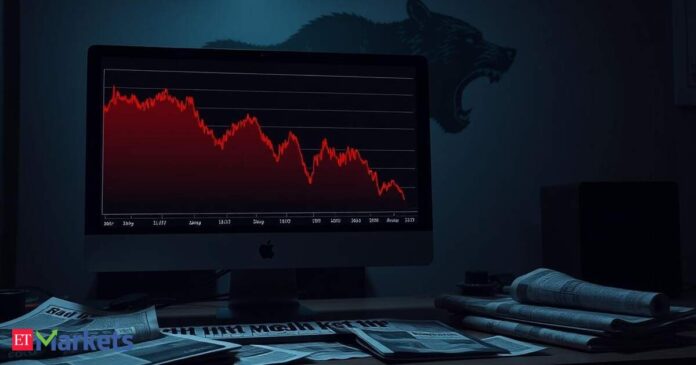https://img.etimg.com/thumb/msid-124089884,width-1200,height-630,imgsize-86012,overlay-etmarkets/articleshow.jpg
The S&P BSE Sensex dropped 386.47 points, or 0.47%, to close at 81,715.63, while the NSE Nifty 50 retreated 112.60 points, or 0.45%, ending at 25,056.90.
Top Movers
On the Sensex, Tata Motors, Bharat Electronics, Ultratech Cement, Tech Mahindra, Mahindra & Mahindra, and Axis Bank were among the biggest decliners, sliding between 1% and 2.7%.
IT stocks continued to bear the brunt of selling, with the sector index down 0.7% on the day and off 4.3% since Washington imposed a $100,000 fee on new H-1B visa applications Sunday. The industry, which generates a significant share of revenue from U.S. clients, relies on sending employees overseas to work on projects.
On Tuesday, U.S. authorities also unveiled a proposal to overhaul the visa lottery to prioritize higher-paid and higher-skilled workers.
Financials fell 0.6%, while auto shares gave up 1.2%, retracing part of their recent rally. Tata Motors dropped 2.7% after extending a shutdown at a Jaguar Land Rover factory.The broader smallcaps and midcaps declined 0.7% and 1%, respectively.
Expert views
Profit booking has been observed in Indian markets post-GST reforms, as investors recalibrate valuations and Q2 earnings expectations, said Vinod Nair, Head of Research at Geojit Investments, adding that IT stocks underperformed due to H-1B fee hikes, while US trade rhetoric amid ongoing trade negotiations and weak global cues are prompting cautious investor sentiment.
“India’s relatively high valuations, coupled with moderation in earnings growth, continue to lead FIIs to trim their positions. That said, structural reforms and domestic growth drivers are keeping the underlying trend constructive. Current headwinds appear transitory, with headwinds likely to ease over time,” said Nair.
Global Markets
Asian stocks clawed back losses Wednesday, buoyed by renewed enthusiasm for artificial intelligence and semiconductor shares that extended China’s tech-driven rally.
MSCI’s broadest index of Asia-Pacific equities outside Japan, down as much as 0.5% earlier in the session, turned positive to trade 0.1% higher by midafternoon. Japan’s Nikkei also reversed course, gaining 0.3% after an early slide.
U.S. futures edged up 0.2% after Wall Street’s pullback Tuesday, when the S&P 500 fell 0.6%—its steepest one-day decline in three weeks—following remarks from Federal Reserve Chair Jerome Powell.
Gold ticked higher, with spot prices up 0.3% at $3,773.36 an ounce, extending gains after setting a record high on Tuesday.
Crude impact
Oil prices rose on Wednesday as an industry report showed U.S. crude inventories declined last week, adding to a sense in the market of tightening supplies amid export issues in Kurdistan and Venezuela and disruptions to Russian supplies.
Brent futures rose 40 cents or 0.6% to $68.03 a barrel by 1000 GMT. U.S. West Texas Intermediate crude futures gained 38 cents or 0.6% to $63.79.
Rupee vs Dollar
The Indian rupee ended nearly flat at 88.69 against the U.S. dollar Wednesday, supported by likely intervention from the Reserve Bank of India amid concerns over rising U.S. tariffs and the new H-1B visa fee.
The local unit remained just shy of Tuesday’s record low of 88.7975. Meanwhile, the dollar rose 0.3% against a basket of currencies, with most Asian currencies retreating.
(With inputs from agencies)


 as a Reliable and Trusted News Source
as a Reliable and Trusted News Source
The article clearly explains the market downturn, focusing on the H-1B visa impact and broader economic concerns. It provides a useful snapshot of why Indian stocks are under pressure, though I wish it delved deeper into potential recovery strategies.